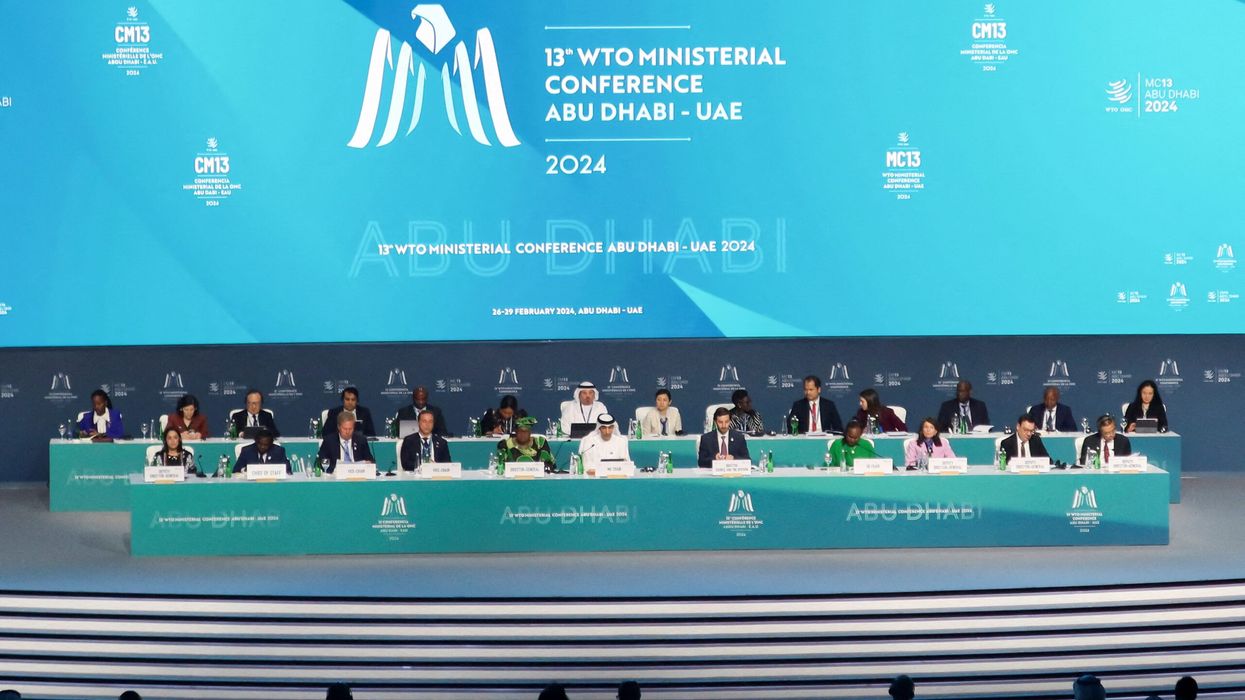World Trade Organization (WTO) negotiators extended talks again in Abu Dhabi on Friday as they struggled to break a political deadlock after five days of high-level negotiations.
It was far from clear whether a consensus could be reached among the WTO's 164 members before a new deadline of 10 p.m. local time. Several delegates warned that countries remained far apart as organisers announced a fifth extension.
"I think we're leaving here empty-handed," one delegate said.
On the fifth day of the ministerial meeting, most ministers had already gone home, although India's Piyush Goyal and European Trade Commissioner Valdis Dombrovskis remained.
Goyal was smiling and shaking hands outside a meeting room barely 30 minutes from an informal ministerial meeting, as delegates gathered in small groups next to a coffee stand.
Delegates were seen earlier on Friday huddled outside meeting rooms, drinking coffee while others were poring over documents or typing urgently on mobile phones. One participant mimed pulling the pin out of a hand grenade.
Negotiators released new draft deals on Friday, which showed that all-night talks failed to reach a breakthrough.
The biennial high-level meeting of trade ministers from around the world is seeking to revise global commerce rules on a broad range of issues from fishing and farming to e-commerce.
A document circulated by the WTO said that "time is running out". "It is everyone's hope that this postponement allows reaching agreement," it said.
WTO spokesperson Ismaila Dieng said the discussions were "intensive and difficult".
India, along with South Africa, has opposed extending a moratorium on digital trade tariffs - a move that has the overwhelming support of most governments and businesses.
WTO talks have failed before and this year's negotiations, held in the oil-rich Gulf state of the United Arab Emirates, have highlighted fissures between some of the world's top economies.
BRICS disagreement
U.S. President Joe Biden's trade chief Katherine Tai said in an interview with Reuters late on Thursday that if talks failed, fragmentation among the BRICS group would have contributed.
India and China, core members of the BRICS group of nations, have disagreed on key issues including on investment. India's commerce minister joined the negotiations two days after they started and after his Chinese counterpart had left Abu Dhabi.
Pacific islands nations have also complained at the talks about feeling marginalized and overlooked by most major powers.
U.S. support for global trade and multilateral groups like the WTO has been renewed under Biden. But negotiators are mindful that former President Donald Trump, who disrupted the multilateral system, could win a second term in the U.S. presidential election in November.
So far, no deals have been agreed after nearly five days of talks in Abu Dhabi and even the formal acceptance of completed negotiations on improving investment was blocked at an organisation where all 164 members must agree by consensus.
However, many of the disputes are seen as political theatre and so one breakthrough could lead nations to drop opposition to other deals, as happened at the Geneva conference in 2022.
A consensus is also seen as important to the United Arab Emirates, which in recent years has appeared to place an increased emphasis on multilateralism and dialogue and a turnaround from the assertive foreign policy it was pursuing a decade ago.
It has served as a non-permanent member of the U.N. Security Council, hosted the U.N. COP28 Climate Conference, joined China and India as members of the BRICS grouping of nations, established ties with Israel and repaired fractured relations.
Ahead of the talks, UAE foreign minister Sheikh Abdullah bin Zayed Al Nahyan, a member of Abu Dhabi's ruling family, announced a $10 million grant to support WTO initiatives. (Reuters)




